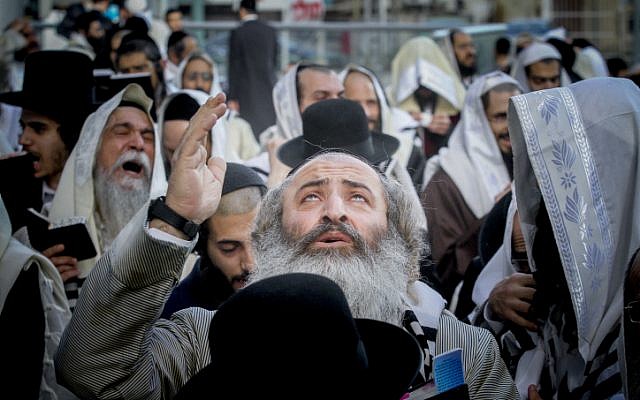On charismatic rabbis and cults
Judaism has many models of rabbinic leadership, but none of them
legitimately requires followers to stop thinking for themselves
 | ||
| Ultra-Orthodox men gather in front of the Embassy of South Africa in Ramat Gan, during a demonstration in support of Eliezer Berland, who was then jailed in South Africa, , on April 25, 2016 |
by Rabbi Yosef Blau
Often a talmudic scholar, the leader sometimes claims a unique approach to learning that outside rabbis do not understand.
Are there specific factors that gave rise to an increase in this troubling phenomenon? Perhaps the impact of the radical changes in the experience of the Jewish people, from the devastation of the Holocaust to the re-establishment of the Jewish state has increased confusion, leading to an openness to a charismatic religious figure who can explain the events and give them meaning. In the 71 years of the State of Israel, there has been a lack of security caused by wars and terrorism, accompanied by extraordinary events that imply Messianic significance. The euphoria following the Six Day War was tempered by the complexity of the Yom Kippur War. The ingathering of the the exiles, including the Russian Aliyah from the “Jews of Silence,” as well as that of Ethiopian Jews, whose very existence was barely known, was all followed by a limited integration. Israeli society is split on the most basic issues.
There is a consensus that the official rabbinic leadership has declined and is mired in politics. Within both the religious Zionist community and the Haredi world, there are endless subdivisions. It is an era ripe for those who claim to have the answers. Joining a small but united community creates a sense of security. Accepting the all-knowing religious leader whose path will lead to redemption frees one from confronting a world of confusion and inconsistencies.
Since this kind of rabbinic leader claims to function within Orthodox tradition, many, including rabbis, do not see the potential danger. For those who look, however, there are clear warning signs.
For example: any deviation from loyalty to the leader leads to shunning, if not expulsion. The leader’s behavior is not subject to the same scrutiny as that of his followers because he has established himself as beyond the understanding of others. While listening to rabbinic authority is an integral element in Orthodox Judaism, traditionally, that applied to areas of religious law. Even in the Hasidic world, where the rebbe is consulted on all kinds of matters, the rebbe does not force his followers to ask for his direction, nor does he check on their loyalty.
The growing acceptance of the doctrine of Daat Torah, which assign superior knowledge in non-halakhic matters to great rabbis, makes the line separating normative Orthodox Judaism from rabbinic cult leaders less clear. Neo-Hasidism, which in effect is creating new Hasidic rebbes, has yielded groups of followers who assume that the assertion of ruach hakodesh (divine inspiration) is standard for a rebbe. The dangers associated with religious cults warrants a healthy dose of skepticism.
I hesitate to tread on questions of whether we are on a clear Messianic path and how close, but I encourage skepticism of anyone who claims to know particularly if he will play a major role in the process. Precisely because we live in an extraordinary time in Jewish history, we have to be particularly alert to the danger of one who has all the answers — as long as we follow only his leadership. It is irrelevant whether the charismatic leader is manipulative or delusional, sincere or a fraud, one should never give up his or her right to make one’s own choices.


